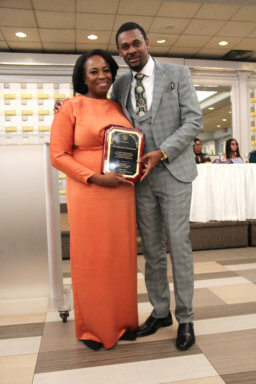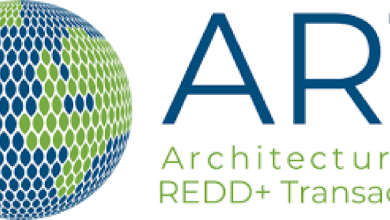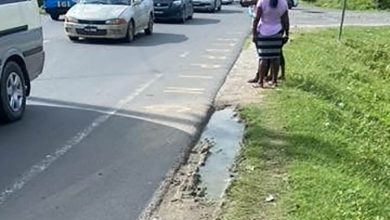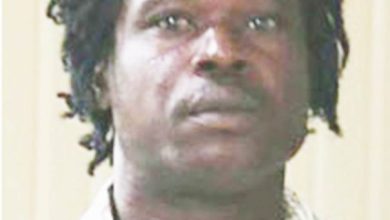‘Doctor of the Year’ attributes COVID-19 survival to resilience

A Vincentian-Haitian physician, who in March was named “Doctor of the Year” for her collegiality, collaboration and contributions to New York-Presbyterian Hospital’s nursing practice by Columbia University Medical Center, attributes survival through the COVID-19 pandemic to resilience.
“The pandemic forced us outside of our comfort zone, challenged us to adapt to new circumstances; it forced us to take a step back and re-evaluate our lives before the pandemic; and not everything worked for all of us,” said Dr. Charlene Emmanuel – the daughter of a retired Vincentian-born registered nurse and a retired Haitian-born physician who reside in Queens – in delivering the keynote address during the 43rd Gala Independence Awards Ceremony and Dance of St. Vincent and the Grenadines, at Russo’s on the Bay, in Howard Beach, Queens, on Oct. 30.
“Some of us were running around being stressed, burnt out and exhausted, trying to squeeze every second out of every day,” added Dr. Emmanuel at the event, organized by the Brooklyn-based umbrella Vincentian group, Council of St. Vincent and the Grenadines, U.S.A., Inc. (COSAGO). “Society was not valuing certain occupations that are vital to our daily existence, like the men and women who helped to keep our supermarkets stocked and running during the pandemic.
“It turned out to be a time that was more critical than we truly initially realized,” continued Dr. Emmanuel, Assistant Professor and OB/GYN Site Director at New York-Presbyterian’s Broadway Practice of the Ambulatory Care Network in the Department of Obstetrics and Gynecology. “Us surviving and still being here today is due to resilience.”
She noted that resilience is defined as “the ability to adapt successfully to challenges that threaten the functioning, the survival, or the development of a system.”
“COVID did just that,” she said, stating that, when speaking to the graduating students at the University of California, Berkeley in a commencement speech, Sheryl Sandberg, the author of “Lean In,” offered: ‘You are not born with a fixed amount of resilience. Like a muscle, you can build it up, draw on it when you need it. In that process, you will figure out who you really are—and you just might become the very best version of yourself.’
“I think what we saw during this catastrophic pandemic was that we all depend on the resilience of many systems in our lives to survive,” Dr. Emmanuel added. “We learned how interdependent we are, and how much we need the support of other people to simply exist – whether it is members of our health care teams, our church communities, the men and women that work in delivery and supply chains, or our families and friends.
“Resilience in a species is also necessary for survival,” she continued, stating that, among other things. “Vincentians have a long history of biological and cultural evolution that has equipped us with tremendous potential for resilience. Carib Indians aggressively prevented European settlement and attempted enslavement on St. Vincent (and the Grenadines) until the 18th century.
In addition, Dr. Emmanuel said natural elements – such as the eruptions, over the years, of La Soufrière volcano – have also led to the resilience of Vincentians.
“But yet, despite all this, here we still are, the embodiment of resilience,” she said. “Despite all that COVID has taken away from us, it has also presented us with a unique opportunity.
“It is lovely to be here, talking to you under what we now consider to be the ‘new normal’,” she added.
Dr. Emmanuel said the pandemic was “extremely stressful” for everyone, pointing out that isolation and fear led to increases in the rates of depression, anxiety, suicide and substance abuse.
“Ways that we previously used to cope with stress and activities that made us happy were no longer available to us,” she said. “We need to do more to destigmatize mental illness in the hopes that more people will avail themselves of mental health services when needed.
“With the pandemic, mental health resources have become more ubiquitous and available; there are more on-line and virtual options and more flexible hours for working individuals,” she added. “I urge anyone contemplating seeking mental health services or anyone struggling with mental health issues to avail themselves of these services.”
Dr. Emmanuel said collective healing, including mental healing, can only occur by making one better in all aspects.
“By taking care of and improving yourself, you are contributing to the health of your community at large,” she said. “Self-care is crucial.”
In addition, she said the ability to rebound faster is connected to resilience.
“Adversity, trauma and conflict do not discriminate,” Dr. Emmanuel said. “We must recognize that change is constant, and we must be open to the possibilities.
“And not all change is bad,” she added. “We must see past the tragedy, crisis, the setback and see it as an opportunity to create a better tomorrow; if not for ourselves, then for others. Our ability to envision a brighter future will always help us through hard times.
“To evaluate your own resiliency, take note of your willingness to do new things,” she continued. “Also, look at your ability to modify or change how you do things. Examine your actions after a setback. See how long it takes you to seek out information, or to take action to resolve your problems.
We cannot always wait for the storm to be over; we sometimes need to see what we can accomplish despite the rain.”
Dr. Emmanuel said there is no certainty in life, but stated that one can make oneself more resilient by the way one reacts to uncertain times.
“Make sure that you ‘grow through’ all the things you must ‘go through’”, she urged. “And when you feel at your lowest point, just remember that rock bottom can be the most solid foundation on which to build a new future.”




